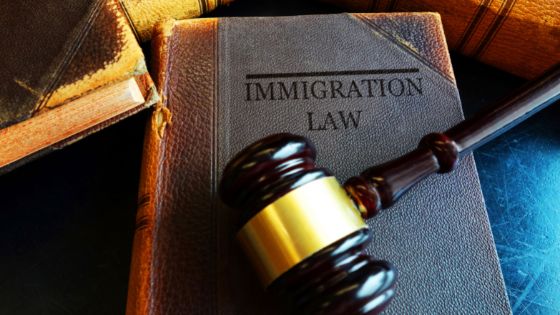Immigrants experience unique challenges when they first arrive in the United States. One of those challenges is figuring out how the deportation process works. “Is it time to look for an immigration lawyer near me?” you might wonder yourself.


This blog post will explain what happens when someone is deported from the U.S., and we’ll answer some common questions about the process. Stay tuned for more information about staying safe and avoiding deportation!
What is Deportation, And Who Can Be Deported?
Deportation is the Removal of an Alien from the United States. The Secretary of Homeland Security may deport an alien present in the United States without being admitted or paroled or who has violated the terms of their admission or parole.
An alien is ordered deported subject to detention until removed from the United States. Unless you have been granted asylum or refugee status if you are deported, you will not be allowed to return to the United States for some time, or possibly ever.
Who Can Be Deported?
Any alien in the United States without permission from the U.S. government can be deported. That includes aliens who:
- Entered the country without going through an immigration inspection.
- Entered the country legally but then remained past the date they were required to leave.
- Violated the terms of their visa or other permission to enter or stay in the United States.
You can also be deported if you are convicted of certain crimes, even if you entered the United States legally and have never violated any immigration laws.
Crimes that may result in deportation include, but are not limited to, those involving moral turpitude (such as fraud or theft) and aggravated felonies (such as murder or rape). You can also ask for advice from a local immigration law firm.
How Does The Process Of Deportation Work
If you or someone you know faces deportation, it’s essential to understand the process. Depending on the circumstances, deportation can be a lengthy and complicated process.
- First, an individual will receive a Notice to Appear (NTA) from Immigration and Customs Enforcement (ICE).
- The NTA will list the charges against the individual and their right to a hearing before an immigration judge.
- After receiving the NTA, the individual will be taken into custody and may be held in an ICE detention center until their hearing.
- If the individual is released from custody, they will be required to wear an electronic monitoring device.
- At the hearing, the judge will decide whether or not to deport the individual. If the judge orders deportation, the individual will be removed from the country and may not re-enter for a while.
- It’s important to note that the individual has the right to appeal the judge’s decision.
Appealing a deportation order can be a complex process, and it’s vital to seek legal assistance if you or someone you know is facing deportation.
What Are The Consequences Of Deportation?
Deportation can have consequences for both the person being deported and their family.
- It can cause tremendous emotional distress. Being forcibly separated from your home and loved ones is a traumatic experience that can leave lasting psychological scars.
- Deportation can also have a financial toll, as it often results in the loss of income and savings.
- Deportation can also lead to social isolation and discrimination. People who have been deported often find it difficult to rebuild their lives, as they are cut off from their support networks and face prejudice from those around them.
As a result, deportation can have far-reaching and devastating consequences. If you or someone you know is facing deportation, it’s vital to seek legal assistance as soon as possible.
Can Deported People Return To The United States
If you’ve been deported from the United States, you may be wondering if you’ll ever be able to return. The answer is complicated and depends on some factors. That includes the reason for your deportation and where they will deport you.
Generally speaking, it isn’t easy to return to the U.S. after being deported. However, it is not impossible.
There are a few ways that deported people can try to return to the United States, but it is essential to remember that the process is often long and complicated, and there is no guarantee of success.
If you’re considering attempting to return to the U.S., it’s essential to talk to an immigration lawyer who can help you understand your options and the chances of success.
How Can People Avoid Being Deported?
The first thing to know is that you can’t be automatically deported because you’re undocumented. There are certain protected groups, like asylum seekers, refugees, and victims of human trafficking, who can’t be deported no matter what. But if you’re not in one of those groups, it’s still possible to avoid being deported.
The best way to do that is to have a “cancellation of removal.” When a judge decides that, even though you’re undocumented, it would be unfair to deport you because you have strong ties to the U.S.
- For example, if you have family here who depend on you, or if you’ve been living in the U.S. for a long time without any problems, the judge might cancel your removal.
- Another way to avoid being deported is to get a “waiver.” That’s when the government forgives your immigration violations and lets you stay in the U.S.
Even if you don’t have cancellation of removal or a waiver, there are other ways to avoid being deported. For example, if you have a green card and get arrested for certain types of crimes, the government can’t deport you until after a hearing in front of a judge.
If you’re undocumented but have what’s called “deferred action,” the government can’t deport you either. Deferred action is when the government agrees to put your deportation on hold for a certain period, usually two years.
Hiring An Immigration Lawyer
If you’re considering hiring immigration lawyers, you’re probably feeling overwhelmed. After all, the immigration process can be complex and confusing.
With the help of a qualified immigration attorney, you can navigate the system more efficiently and improve your chances of success. Here are a few things to keep in mind when choosing an immigration lawyer:
- Make sure the attorney is experienced and knowledgeable about immigration law. Ask about their success rate with cases like yours. Also, ask whether they’re familiar with the particular rules and regulations that apply to your situation.
- Choose an attorney who you can trust. That is someone you’ll be sharing personal information with, so it’s crucial that you feel confident in their ability to handle your case sensitively and professionally.
- Be sure to ask about fees upfront. Many immigration lawyers charge by the hour, so be sure to estimate how much your case is likely to cost. Once you’ve considered these factors, you’ll be better positioned to choose the right immigration lawyer for your needs.
Avoiding Deportation
Now that you know how deportation works, what can you do if it becomes a reality for you or someone you know? The good news is that many immigration attorneys can help.
Contact us today to find an experienced lawyer in your area who can help guide you through the process and represent your interests.
We understand just how much is at stake in a deportation case, and we want to make sure you have the best chance of staying in the country and keeping your family together.
















